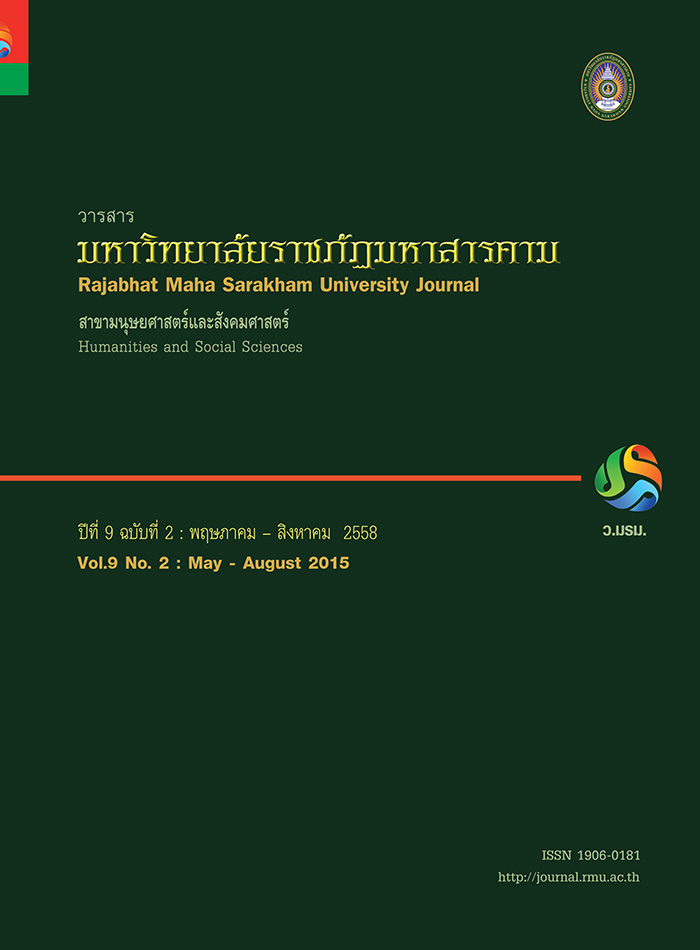ปัจจัยเชิงสาเหตุที่ส่งผลต่อการขับเคลื่อนแผนชุมชนสู่การพัฒนาอย่างยั่งยืน; Determining the Causal Factors Driving the Community Plan for Sustainable Development
Main Article Content
บทคัดย่อ
การวิจัยนี้มีวัตถุประสงค์การวิจัยเพื่อวิเคราะห์ปัจจัยเชิงสาเหตุที่ส่งผลต่อการขับเคลื่อนแผนชุมชนสู่การพัฒนาอย่างยั่งยืน
กลุ่มตัวอย่าง คือ ผู้นำชุมชนในจังหวัดมหาสารคาม และจังหวัดกาฬสินธุ์ จำนวน 400 คน ใช้วิธีการสุ่มอย่างง่าย ตัวแปรที่ศึกษา
ประกอบด้วย ตัวแปรอิสระ 3 ตัว ตัวแปรคั่นกลาง 3 ตัว และตัวแปรตาม 1 ตัว เครื่องมือการวิจัย ได้แก่ แบบสอบถามประมาณค่า 5
ระดับ จำนวน 7 ชุด เก็บรวบรวมข้อมูลด้วยแบบสอบถาม วิเคราะห์ข้อมูลด้วยสถิติเชิงบรรยาย และวิเคราะห์โมเดลสมการโครงสร้าง
ด้วยโปรแกรม LISREL 8.72 ผลการวิจัยพบว่า โมเดลเชิงสาเหตุที่ส่งผลต่อการขับเคลื่อนแผนชุมชนสู่การพัฒนาอย่างยั่งยืน มีความ
สอดคล้องกลมกลืนกับข้อมูลเชิงประจักษ์ (????2 = 17.02, df = 13, p = .05, RMSEA = .03, GFI = .99, AGFI = .98) โมเดลสามารถ
อธิบายความแปรปรวนของการขับเคลื่อนแผนชุมชนสู่การพัฒนาอย่างยั่งยืนได้ 37% ตัวแปรเชิงสาเหตุที่ส่งผลทางตรงต่อการขับเคลื่อน
แผนชุมชนสู่การพัฒนาอย่างยั่งยืน อย่างมีนัยสำคัญทางสถิติที่ระดับ .01 ได้แก่ การขับเคลื่อนโดยการดำเนินกิจกรรมเพื่อพัฒนาชุมชน
(0.31) ทุนทางชุมชน (0.20) การมีส่วนร่วมของชุมชน (0.18) และการประสานภาคีความร่วมมือ (0.18)
The purpose of this study was to determine causal factors regarding the community plan to drive
sustainable development. Research subjects consisted of 400 Maha Sarakham and Kalasin community
leaders by simple random sampling method. The model consisted of three independent variables, three
mediator variables and one dependent variable. The research instrument was a five-point rating scale
questionnaire, composed of seven main parts. The survey was conducted via both online survey and
questionnaires. The LISREL version 8.72 was used to analyze the linear structural equation model. Research
results show that the causal model of community plan driving movement processes to sustainable development
fits the empirical data (????2 = 17.02, df = 13, p = .05, RMSEA = .03, GFI = .99, AGFI = .98). The model can
explain the 37% variance in community plan processes driving sustainable development. The causal variables
which had direct effect on determining the community plan driving movement processes on sustainable
development were: community development activities (0.31) community capital (0.20) community participation
(0.18) and coordinating cooperative efforts (0.18).
Article Details
1. บทความที่ลงตีพิมพ์ทุกเรื่องได้รับการตรวจทางวิชาการโดยผู้ประเมินอิสระ ผู้ทรงคุณวุฒิ (Peer Review) สาขาที่เกี่ยวข้อง อย่างน้อย 3 ท่าน ในรูปแบบ Double blind review
2. ข้อคิดเห็นใด ๆ ของบทความที่ลงตีพิมพ์ในวารสารมหาวิทยาลัยราชภัฏมหาสารคาม นี้เป็นของผู้เขียน คณะผู้จัดทำวารสารไม่จำเป็นต้องเห็นด้วย
3. กองบรรณาธิการวารสารมหาวิทยาลัยราชภัฏมหาสารคาม ไม่สงวนสิทธิ์การคัดลอกแต่ให้อ้างอิงแสดงที่มา


